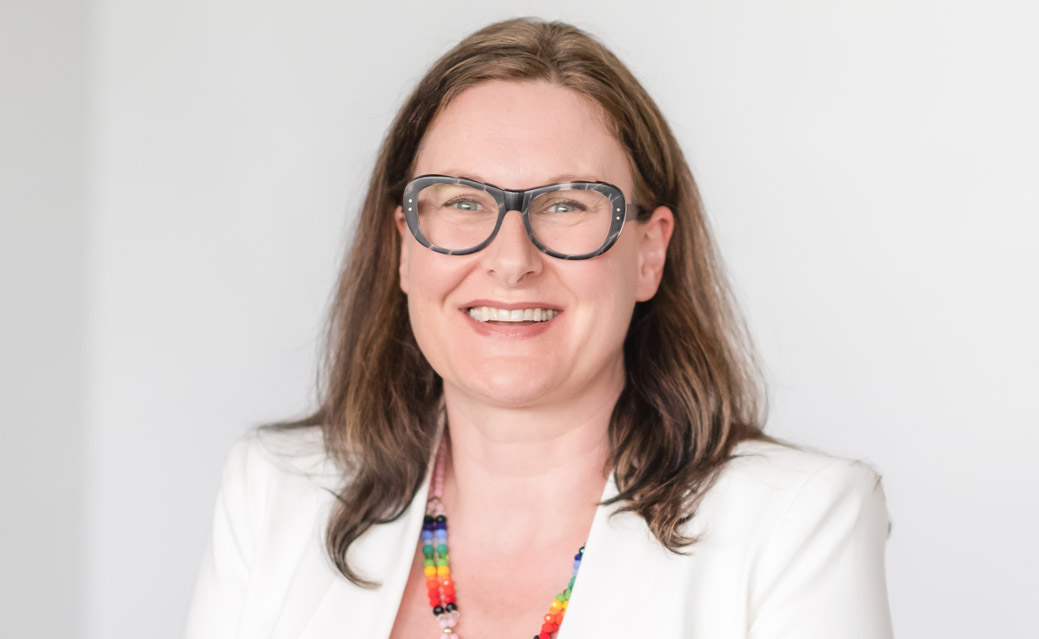Principal Alexandra Gillespie: How the past shapes the present
As a book historian at heart, Gillespie reveals how her past experiences have prepared her to be principal of UTM.
“We all, you know, nearly died,” shares Principal Alexandra Gillespie. Several years ago, the birth of her premature twins almost resulted in death for both mother and children. Gillespie recalls that it took nine hours to stabilize her daughter and countless days afterwards to run tests. “I was very unwell, and it was really, really tough. I just kept feeling like I couldn’t do it.” The words of an ICU nurse helped her push through. “Don’t ask yourself the question, ‘can I do it?’ Just do it.”
Today, Gillespie still reflects on those words as she serves as principal of the University of Toronto Mississauga (UTM), a task that she describes as a team effort. She discusses her role as principal with confidence despite the colossal weight of her responsibilities. Multiple months of strategizing safety protocols preceded UTM’s slow transition to in-person learning. “Is it hard to make decisions? No, because that’s literally what I’m paid to do,” asserts Gillespie. “That’s what a leader is.”
When morning arrives and light streams through the historic windows of Lislehurst, the first thing Gillespie does is check for recent news. “The other reason why it’s not hard [to make decisions] is because you don’t make those decisions on your own,” she continues. Part of her team’s process involves receiving information from public health officials and weighing the pros and cons of possible plans of action and their outcomes.
“I feel really good about where we’ve ended up, but I can’t pretend it’s not hard because it’s changing a bit almost every day. In a situation like this, no direction will be perfect,” adds Gillespie. She knows that some opposition is inevitable, especially when it comes to public safety, but shares that she is ready to bear the consequences of her decisions. “There’s a point when you have to think, and then there’s a point at which you just have to do.” Gillespie continues, stating that “you have the capacity to say sorry when you get it wrong.”
Gillespie started at UTM as an assistant professor specializing in manuscript studies, medieval literature, and the global history of book technologies. She describes herself as a historian at heart. “I think about the past, and I think about the way the past is based upon the present.” As a child, she dreamt of becoming a creative writer, but her longing to interact with people led her to pursue a less isolating career.
She describes her current day-to-day workflow as “supreme multitasking,” which keeps her “excited and happy.” Despite being occupied by meetings, mentoring graduate students in her lab, and communicating with the community, she still manages to research, revise articles, and even write new books.
Her methodology to academic leadership stems from her literary degree and work as director of U of T’s Old Books New Sciences lab, which has taught her to apply close-reading and openness to understanding: “I don’t believe that some forms of knowledge are better or more important than others,” Gillespie states.
She further reflects, “I do think that some might be more useful in different circumstances, but I’m really interested in the different ways that knowledge is produced, especially in an academic environment.”
As an example, Gillespie considers vaccine hesitancy in the community—a debate that has caused division across the nation. She advises that openness requires thinking for oneself, but also being unafraid of considering what others think. “Why is this person asking this question, where are they coming from, what language are they using, what is motivating them, how can I connect with them?” Gillespie summarizes with a simple statement. “Empathy and openness have to have their limit, but it is still a really good starting place.”
Social distancing and mandatory vaccines are one of the ways UTM hopes to reduce transmission, especially in an environment where thousands of people interact. “Delta is giving us a fourth wave,” stresses Gillespie. “I’m hoping that the measures we put in place are such that when we say you can be in-person, you can keep being in-person even in a fourth wave. That’s what we hope, but in a way, what we hope and what the virus does are two different things.”
In addition to the issues surrounding public health and safety, Gillespie’s work as a book historian has also influenced her role as principal through the critical analysis of historical narratives. “We have a responsibility and have to recognize that our institution was raised in the context of genocidal colonialism whose structures is our duty to dismantle,” explains Gillespie. “We have to get the stories about the past right if we’re going to understand the present. And getting things right is hard work. You have to keep at it.”
Also concerned about how UTM contributes to the local community, she discusses the social determinants of well-being, increasing poverty rates in Mississauga, and urban development. “As we contribute to our local community, how can we therefore contribute to the world? Because I think that’s how you do things, you start locally in order to model what global change can look like.”
When we asked Gillespie what she hopes to accomplish before her term as principal ends in December 2025, she reveals that her team is drafting a strategic framework focusing on truth, reciprocity, and openness—the first of its kind for UTM.
“Planning what’s going to happen next week, or even what’s going on in two years, is extremely difficult and possibly a fool’s game. So rather than planning, how do we orient ourselves? How do we frame what we do? How do we guide ourselves by values and principles that we know will hold no matter what happens?”
Echoing the responsibilities under the Truth and Reconciliation Commission of Canada to Indigenous Peoples, the university plans to build an Indigenous house, which will be a space for Indigenous faculty and staff, as well as a place for public learning. Gillespie also discusses the university’s hopes to innovate student success, to build new partnerships with researchers, hospitals, social justice groups, and to be “good stewards and good community members.” She shares that her work as principal and the projects she works on are founded upon the vision and hard work of many principals before her. This is something she reflects on as she writes her book on academic sector leadership, embedded with personal memoirs about her experiences—both positive and negative—that have shaped her journey.
Her advice to students seeking to make the most of their academic experience is to come to campus and make use of resources, even if their classes are held online. “Connect with other human beings and the world around you,” Gillespie says. She adds that while a happy ending is not guaranteed, and that “there’s no narrative closure on this pandemic,” that we can still “take care of one another, be kind, and be patient.”
Principal Gillespie’s world has become a locus of questions offering an abundance of answers, like the timeless manuscripts she studies. Her study of texts has trained her to be open to new narratives as new challenges arise. And as she writes her own leadership memoir and reflects on U of T’s history, Gillespie remains curious and connected, constantly aiming to “square that circle.”



